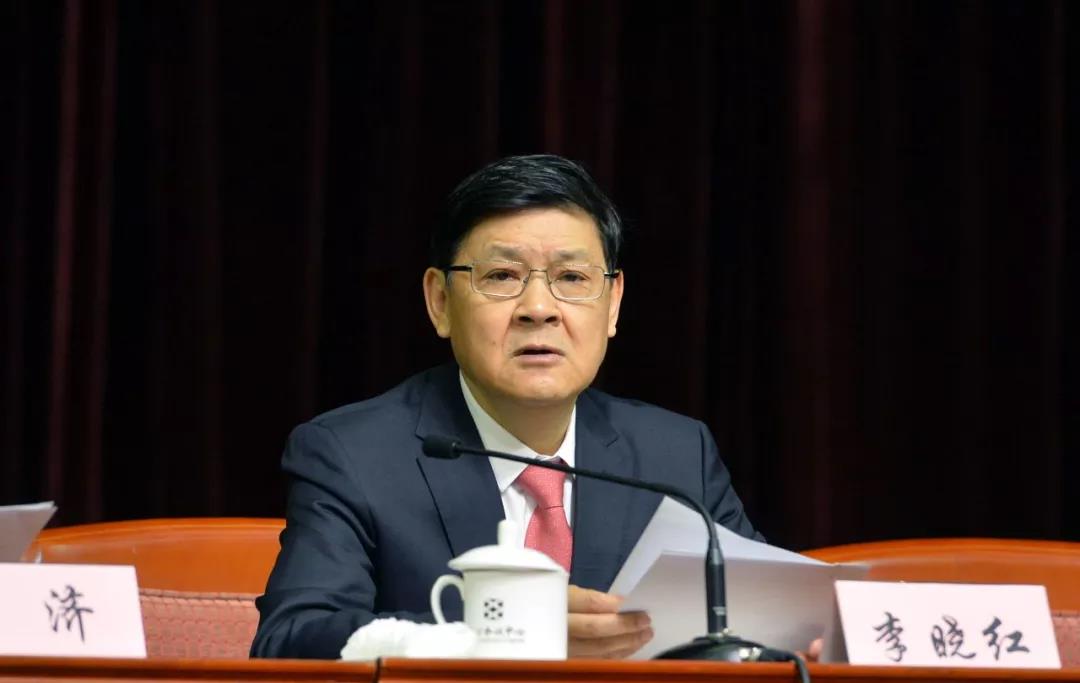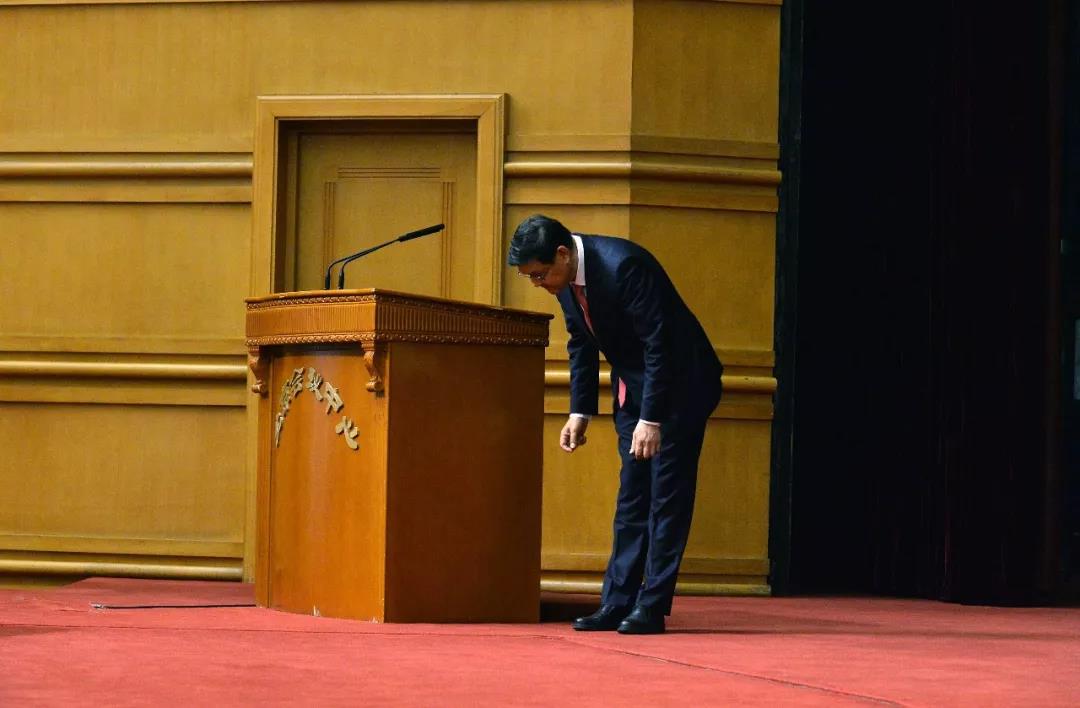The 14th Academician Meeting of Chinese Academy Engineering ended in Beijing on June 1, 2018. Li Xiaohong, a 59-year-old expert in mine safety technology, was elected as the new president. In the future, he would lead all academicians of CAE to devote themselves to realization of the Chinese dream.

The Chinese Academy of Engineering was founded in 1994, and is the top honorary and consulting academic organization in the engineering scientific and technological circles of China. Li Xiaohong is the 5th president of CAE following Zhu Guangya, Song Jian, Xu Kuangdi and Zhou Ji, and is also the only “young man” who is less than 60 years old when elected as the president.

In accordance with the Constitution of Chinese Academy of Engineering, the president and vice president of CAE are both elected from the academicians at the Academician Meeting, and have tenure of 4 years. Re-election is allowed once.
Chen Zuoning, Zhong Zhihua, Deng Xiuxin, He Huawu and Wang Chen were elected as vice presidents of CAE on June 1. In particular, Chen Zuoning was re-elected.


The new president Li Xiaohong is a native of Hechuan, Chongqing. In 1978, he was admitted by the Mining Department of Chongqing University and in 1993 he obtained his doctoral degree. In this period, he studied at University of California, Berkeley from 1989 to 1991. In 2003, he was appointed as the president of Chongqing University. In 2010, he was transferred to Wuhan University and started to act as the president there. In 2016, he was appointed as the vice minister of the Ministry of Education. In June 2017, Li was appointed as the secretary of the CPC Group of Chinese Academy of Engineering. He has once acted as the director of the National Key Lab for Coal Mine Disaster Dynamics and Control and is a chief scientist under the “973 Program”. In 2011, he became an academician of CAE in the Faculty of Energy and Mineral Engineering.
Li Xiaohong has been engaged in research of water jet technology and its application in coal mine safety engineering, and has made a number of important research achievements in coal-bed gas exploitation and prevention of gas disaster in complicated coal mines.
To tackle the frequent gas disasters in complicate coal mines of China, Li Xiaohong has proposed the academic idea of advanced prevention of disaster and integrated exploitation and utilization of coal-bed gas, and invented a gas, solid and liquid-phase oscillating jet that is able to generate impulse stress waves and acoustic shock waves. He also developed a technology which uses innovatively multi-phase oscillating jet to form fissures in the coal bed to increase its gas permeability and strengthen the gas desorption, and independently developed a complete set of equipment of advanced control of coal mine gas disasters. It is now used in nearly 50 coal mines in Chongqing, Sichuan, Guizhou, Shanxi, Henan and Anhui, and has made great contributions to the safe production of coal mines in
China
. The achievements of Li Xiaohong have been listed as the national major scientific and technological achievement transformation projects and are now playing a leading and demonstrating role nationwide.
As a chief scientist under the “973 Program”, Li Xiaohong is currently engaged in research of supercritical carbon dioxide intensified shale gas exploitation.
The fundamental project of high-efficient supercritical carbon dioxide intensified shale gas development under the “973 Program” includes formation of theoretical system and techniques for high-efficient supercritical carbon dioxide intensified shale gas development through fundamental research and key technological problem tackling in areas such as rock breaking using supercritical carbon dioxide, permeability enhancing through fracturing and replacement of shale gas mechanism. Specifically, the liquid carbon dioxide is injected into the shale gas well, and when the temperature and pressure respectively exceed 31.1℃ and 7.38MPa, the carbon dioxide would turn into the supercritical status. At this moment, the carbon dioxide has advantages of gas, like low viscosity, super-high mobility and permeability, and advantages of liquid, like high intensity. The carbon dioxide absorbing capacity of shale is 4 to 20 times the shale gas absorbing capacity and as a result the supercritical carbon dioxide will squeeze the shale gas out.
On June 17, 2017, the project team led by Li Xiaohong carried out the first field test of supercritical carbon dioxide fracturing of shale gas in China at Shaanxi Yanchang Petroleum-Yan 2011 Well in Shaanxi. The test was a successfully one. The dioxide carbon is pressed into the ground and sealed up while the shale gas is exploited and utilized. The success of the test means that
China
has made a critical theoretical and technological breakthrough in independent exploration of effective development of continental facies shale gas, and is now playing a leading role in this area in the world. Hopefully,
China
will find a new path of developing continental facies shale gas in a green, environment-friendly and effective way.
Resume of Li Xiaohong, an alumnus of Chongqing University
Li Xiaohong, male, of Han nationality, born in June 1959, a native of Hechuan, Chongqing and an academician of Chinese Academy of Engineering; Li joined the CPC in March 1983 and started to work in April 1985; he has obtained his postgraduate certificate and the doctoral degree, and the title of professor.
Li currently serves as the secretary of CPC Group and president of CAE.
From 1978 to 1982, Li studied at the Mining Department of Chongqing University, majoring in mining machinery.
From 1982 to 1985, Li studied at the Mining Department of Chongqing University for a master’s degree, majoring in mining engineering.
From 1985 to 1991, Li served as the deputy secretary of General CPC Branch of the Mining Department, CQU and the deputy department head (In this period, Li studied at the University of California, Berkeley from 1989 to 1991; and took on a work-study doctoral program at Chongqing University from 1989 to 1993, majoring in mining engineering).
From 1991 to 1994, Li served as the vice dean of the School of Resources and Environmental Science of Chongqing University.
From 1994 to 1997, Li served as the dean of the School of Resources and Environmental Science of Chongqing University (In this period, Li studied at Queensland University as a senior visiting scholar from March to August 1996).
From 1997 to 1998, Li served as the president assistant of Chongqing University, director of the Scientific Research Office and dean of the School of Resources and Environmental Science of Chongqing University.
From 1998 to 2003, Li served as the vice president of Chongqing University (In this period, Li attended the first session of 2002 themed training class for young and middle-aged leading cadres in colleges and universities organized by the Ministry of Education; in 2002, Li studied in Australia as a shadow president).
From 2003 to 2010, Li served as the president of Chongqing University (In July 2014, Li was officially promoted to the vice-ministerial lever).
In December 2011, Li was elected as an academician of Chinese Academy of Engineering.
From 2010 to 2016, Li served as the president of Wuhan University (of the vice ministerial level).
From 2016 to 2017, Li served as the vice minister of the Ministry of Education and a member of the CPC Group.
In June 2017, Li was elected as the secretary of CPC Group of CAE.
In June 2018, Li was elected as the CPC Group secretary and president of CAE.
(Photography by Hong Xing, a reporter of Science and Technology Daily)
